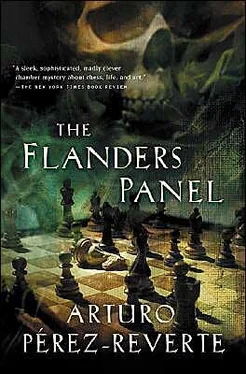And yet on this strange night, in the diffuse light cast through the parchment shade of the English lamp with a base in the form of a book press, which lent strange foreshortenings and shadows to other objects, Cesar paid little attention to her. It was not that he was avoiding her eyes, for when he looked at her he held her gaze, frankly and directly, albeit only briefly, as if between them there were no secrets, as if everything between the two of them would already have been given an answer, precise, convincing, logical and definitive, perhaps the answer to all the questions she had asked throughout her life. But, for the first time, Julia did not feel like listening. Her curiosity had been fully satisfied when she had stood before Brueghel the Elder’s Triumph of Death. She didn’t need anyone now, not even him. And this had happened before Munoz opened an old volume on chess and pointed out to her one of the photographs. Her presence here tonight, in Cesar’s home, was motivated strictly by curiosity, aesthetic curiosity, Cesar would have said. Her duty was to be present, simultaneously protagonist and chorus, actor and audience for the most fascinating of classical tragedies. They were all there: Oedipus, Orestes, Medea and her other old friends. After all, the performance was in her honour.
Yet it was unreal. Julia sat on the sofa, crossed her legs and placed one arm along the back. The two men stood in front of her, and so formed a composition very similar to that in the vanished painting. Munoz, on the left, stood on the edge of an ancient Pakistani carpet, whose faded threads accentuated its beautiful reds and ochres. The chess player – now they were both chess players, thought Julia with perverse satisfaction – had not removed his raincoat. He was looking at Cesar, his head a little to one side, with that Holmesian expression that lent him a peculiar dignity. But he was not looking at Cesar with the smugness of a victor. There was no animosity, nor even, given the circumstances, justifiable apprehension, only tension in his eyes and the twitching muscles in his jaw. That, in Julia’s judgment, was due to the fact that Munoz was now studying the real appearance of the enemy after working for so long only with his ideal appearance. He was doubtless going over old mistakes, reconstructing moves, judging intentions. It was the stubborn, absent expression of one who, having won a game by a series of brilliant moves, is concerned only to work out how the hell his opponent had managed to snatch away one pawn from some irrelevant and forgotten square.
Cesar stood on the right and, with his silvery hair and silk dressing gown, he looked like an elegant figure in a turn-of-the-century comedy: calm and distinguished, conscious that he owned the two-hundred-year-old carpet on which Munoz was standing. Julia watched him draw from a pocket a pack of gold-tipped cigarettes and fit one into his ivory holder. The scene would be engraved for ever on her memory: the backdrop of darkly gleaming antiques, the slender classical figures painted on the ceiling; and, standing face to face, the ageing dandy, elegant and ambivalent in appearance, and the thin, shabby man in the crumpled raincoat, looking at each other in silence, as if waiting for someone, possibly the prompter hidden behind one of the pieces of period furniture, to give the cue to begin the final act.
From the moment Julia had noticed something familiar about the face of the young man staring into the photographer’s camera with all the seriousness of his fifteen or sixteen years, she had guessed that the final act would be more or less like this and how it would end. She looked at her two favourite characters as she sat on Cesar’s comfortable sofa and let her thoughts drift lazily. She would never have got such a perfect seat in a theatre. Then a memory came back to her, a recent memory. She’d already had a glance at the script. It had been only a few hours before, in Room 12 of the Prado: the painting by Brueghel, beating drums providing a background to the annihilating breath of the inevitable, sweeping away as it passed the last blade of grass on earth, and everything subsumed into one last, gigantic pirouette, into the sound of a loud belly laugh from some drunken god recovering from an Olympian hangover somewhere behind the blackened hills, the smoking ruins and the glow of the fires. Pieter Van Huys, that other Fleming, the old master of the court of Ostenburg, had explained it all too, in his own way, perhaps with more delicacy and subtlety, more hermetic and sinuous than the brutal Brueghel, but with the same aim. In the end all paintings were paintings of the same painting, just as all mirrors gave the reflection of the same reflection, and all deaths were the death of the same Death:
“Tis all a Chequer-board of Nights and Days
Where Destiny with Men for Pieces plays…
She murmured these words to herself, looking at Cesar and at Munoz. Everything was ready. They could begin. The yellow light from the English lamp created a cone of brightness that wrapped itself about the two main characters. Cesar inclined his head a little and lit his cigarette. As if that were the signal for the dialogue to start, Munoz nodded slightly and spoke:
“I hope you have a chessboard to hand, Cesar.”
Not the most brilliant of openings, thought Julia, nor even the most appropriate. An imaginative scriptwriter would doubtless have come up with some better words to place in Munoz’s mouth. But, she thought disconsolately, the writer of the tragicomedy was, after all, as mediocre as the world he’d created.
“I don’t think a chessboard will be necessary,” replied Cesar, and with that the dialogue improved. Not because of the words, but because of the tone, which was perfect, particularly that hint of boredom Cesar gave to the phrase. It was a tone typical of him, one he might use were he observing a distant scene from a garden chair, a wrought-iron one painted white, with a very dry martini in one hand. Cesar had his decadent poses down to a fine art, as he did his homosexuality, his perversity, and Julia, who had loved him for that too, could appreciate the value of that rigorous, precise attitude, so perfect in every detail. And the most fascinating thing was that he had been deceiving her for twenty years. Although, to be fair, the person responsible for the deceit was not him, but her. Nothing had changed in Cesar. Now he was feeling no remorse or disquiet for what he’d done. She knew this with absolute certainty. He appeared to be as distinguished and correct as he had when Julia heard from his lips beautiful stories about lovers and warriors, about Long John Silver, Wendy, Lagardere, Sir Kenneth, the Knight of the Couchant Leopard. Yet he was the one who had dumped Alvaro under the shower, rammed a bottle of gin between Menchu’s legs. Julia savoured her own bitterness. If he is himself, she thought, and it’s clear that he is, then the one who has changed is me. That’s why I see him differently tonight, with altered eyes: I see a blackguard, a fraud and a murderer. And yet I’m still here, hanging on his every word, fascinated. In a few seconds, instead of telling me a tale of adventures in the Caribbean, he’s going to tell me that he did it all for me or some such thing. And I’ll listen to him, as I always have, because this is better than all Cesar’s other stories. It surpasses them all in imagination and horror.
She removed her arm from the back of the sofa and leaned forwards a little, not wanting to miss the slightest detail of the scene. That movement seemed the signal to resume the dialogue. Munoz, his hands in his pockets, his head on one side, looked at Cesar.
“Just clarify something for me,” he said. “After the black bishop takes the white pawn on a6, White decides to move his king from d4 to e5, discovering the check of the white queen on the black king. What should Black do next?”
Читать дальше












